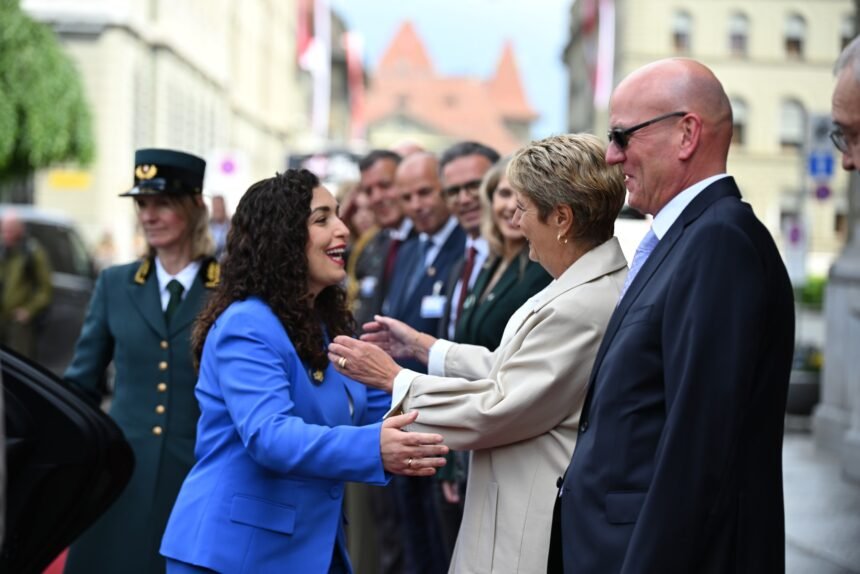“Switzerland rarely organizes state visits. The invitation extended to the President of Kosovo is also a sign of appreciation for the large Kosovar diaspora in Switzerland. The two countries are bound by a history full of events.”
This is how the Swiss newspaper Aargauer Zeitung begins its coverage of President Vjosa Osmani’s state visit to Bern, invited by her Swiss counterpart, President Karin Keller-Sutter.
On Wednesday, the Federal Council welcomed President Osmani and her husband Prindon Sadriu for an official state visit, aimed at honoring and deepening the “close and multifaceted relationship” between Switzerland and Kosovo, the Swiss government said in a press release, as reported by Aargauer Zeitung.
During a joint press conference, both presidents highlighted the positive ties between the two countries. Economic issues topped the agenda, alongside discussions on military deployment in Switzerland.
Keller-Sutter noted that the history between the two countries dates back to the 1960s, when Kosovar workers first came to Switzerland, followed by refugees. President Osmani added:
“Today, they are teachers, doctors, politicians — and exceptional goal scorers,” referring to Swiss football star Xherdan Shaqiri.
According to Tages-Anzeiger, Shaqiri — who plays for FC Basel and is a standout in the Swiss national team — will attend the evening state banquet, along with many prominent members of the Kosovar diaspora in Switzerland. Among them are scientists, entrepreneurs, and politicians, including National Councilor Islam Alijaj, all with roots in Kosovo.
On Thursday, Keller-Sutter and Osmani are scheduled to visit the Stadler Rail train manufacturing plant in Bussnang. Tages-Anzeiger reports that the Government of Kosovo is planning multimillion-euro investments in its damaged railway network, including the construction of a new rail line connecting the capital Pristina with the Albanian port city of Durrës. A visit to the University of St. Gallen is also planned.
“As a rule, the Federal Council invites only one or two foreign heads of state for official state visits to Switzerland per year. It is no coincidence that this special honor is being extended to the President of Kosovo,” writes Aargauer Zeitung.
The article highlights the deep ties between the two countries, largely due to the sizable Kosovar diaspora in Switzerland — around 160,000 people, making it the second largest outside Kosovo after Germany. Kosovo’s population is around 1.8 million.
The first Kosovars arrived in the 1960s, when a farmers’ association in then-Yugoslavia recruited agricultural workers. Over the decades, especially during Switzerland’s long economic booms, more Kosovars arrived to work in construction and the food industry. Many political refugees also found asylum there.
During the Kosovo War between March 1998 and summer 1999, about 50,000 people fled to Switzerland. The country provided humanitarian aid and has since been involved in post-war reconstruction. Switzerland has participated in the KFOR mission with Swisscoy since 1999 — its largest ever foreign peacekeeping mission. In 2008, it was among the first countries to recognize Kosovo’s independence.
“From rejection to success story,” Aargauer Zeitung summarizes.
The paper recalls that in the 1990s and 2000s, Kosovars in Switzerland faced widespread discrimination. Criminal acts by individuals were sometimes politically exploited, for example in the infamous SVP campaign ad claiming, “Kosovars are destroying the Swiss.”
But over the past decades, the integration of the Kosovar community has become a success story. Today, people with roots in Kosovo excel in science, sports, business, and politics. According to Tages-Anzeiger, there are around 6,000 businesses owned by people of Albanian origin in the German-speaking part of Switzerland alone. Switzerland is also the second-largest foreign direct investor in Kosovo.







